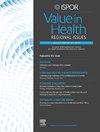Effects of Reimbursement Add-On Policies on Trastuzumab and Bevacizumab Biosimilar Adoption in a Japanese Oncology Setting
IF 1.4
Q3 HEALTH CARE SCIENCES & SERVICES
引用次数: 0
Abstract
Objectives
The Japanese government has introduced reimbursement incentive policies designed to promote biosimilar adoption for oncology biologics, including the provision of a financial incentive of ¥1500 (approximately $10) per prescription to physicians who prescribe biosimilars. This study aimed to evaluate the impact of Japan’s reimbursement policies on the uptake of oncology biosimilars, specifically trastuzumab and bevacizumab, in the outpatient setting.
Methods
We conducted an interrupted time series analysis using the health insurance claims database to assess the impact of the policy on biosimilar uptake, comparing trends before and after the policy intervention.
Results
The analysis incorporated 22 440 trastuzumab and 14 022 bevacizumab claims. For trastuzumab, interrupted time series analysis showed a significant slope change after policy implementation, with a slope change of 0.33% per month (95% CI 0.07-0.58). In contrast, bevacizumab did not exhibit significant changes in slope or level postintervention; however, its biosimilar uptake steadily increased over the entire study period.
Conclusions
This study suggests that reimbursement incentives have significantly enhanced the uptake of trastuzumab biosimilars in Japan, whereas bevacizumab has not exhibited a similar response. Given these findings, it is crucial for policy makers to design reimbursement strategies that are specifically tailored to the characteristics of each biosimilar to optimize their effectiveness.
报销附加政策对曲妥珠单抗和贝伐珠单抗生物类似药在日本肿瘤环境采用的影响
日本政府推出了旨在促进肿瘤生物仿制药采用的报销激励政策,包括向开生物仿制药的医生提供每张处方1500日元(约10美元)的财政激励。本研究旨在评估日本报销政策对肿瘤生物仿制药(特别是曲妥珠单抗和贝伐单抗)在门诊使用的影响。方法利用健康保险理赔数据库进行中断时间序列分析,评估政策对生物仿制药使用的影响,比较政策干预前后的趋势。结果该分析纳入了22 440个曲妥珠单抗和14 022个贝伐单抗申请。对于曲妥珠单抗,中断时间序列分析显示,政策实施后斜率变化显著,斜率变化为每月0.33% (95% CI 0.07-0.58)。相比之下,贝伐单抗在干预后没有表现出显著的斜率或水平变化;然而,在整个研究期间,其生物类似药的吸收稳步增加。本研究表明,报销激励显著提高了曲妥珠单抗生物类似药在日本的吸收,而贝伐单抗没有表现出类似的反应。鉴于这些发现,决策者设计针对每种生物类似药的特点量身定制的报销策略以优化其有效性是至关重要的。
本文章由计算机程序翻译,如有差异,请以英文原文为准。
求助全文
约1分钟内获得全文
求助全文
来源期刊

Value in health regional issues
Pharmacology, Toxicology and Pharmaceutics-Pharmacology, Toxicology and Pharmaceutics (miscellaneous)
CiteScore
2.60
自引率
5.00%
发文量
127
 求助内容:
求助内容: 应助结果提醒方式:
应助结果提醒方式:


